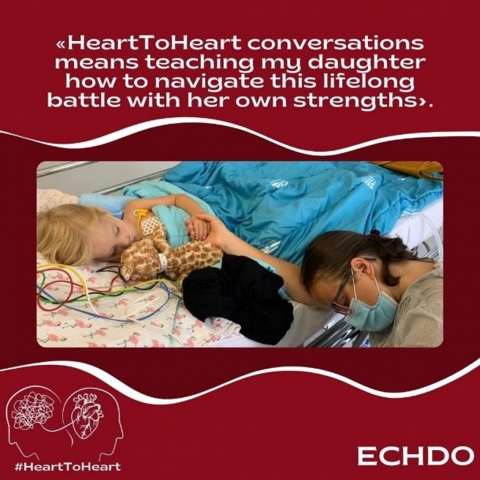When I was pregnant with our firstborn, life felt picture-perfect. We were living in Lebanon at the time. I had a thriving career as a journalist covering international affairs, a loving husband, and the joy and excitement of starting a family. But at 12 weeks, everything changed. During a routine check at Clemenceau Medical Center in Beirut, affiliated with Johns Hopkins International, the obstetrician detected a problem with our baby’s heart. By 20 weeks, the diagnosis was certain, and our lives were changed forever.
Months later, we were in Slovakia, my husband’s homeland. I gave birth to a beautiful baby girl with a single ventricle heart, transposition of the great arteries, ventricular septal defect, pulmonary valve atresia, and pulmonary stenosis. We named her Emanuela.
After nearly seven months in the hospital, we were finally able to bring her home. At the Children’s Cardiac Center in Bratislava, she survived what had been unsurvivable for many before her. After her first open-heart surgery, she was resuscitated. It took 15 minutes to bring her back and stabilize her, after which she was placed on ECMO. Her recovery was full of complications - a brain bleed, severe tachycardias, heart failures. A second open-heart surgery caused irreparable damage to one of her vocal cords. She started rejecting food and required a more permanent feeding tube, eventually undergoing jejunostomy placement surgery. She was tube-fed until nearly her first birthday.
Just before turning two, Emanuela was rushed to the ER with a life-threatening volvulus and malrotation of her intestines. A last-minute surgery saved her life once again. After that, we moved to Belgium, where, at the age of two and a half, the first attempt at ablation in the University Hospital of Leuven, failed. A pacemaker was placed, and only a second ablation a few months later fixed her arrhythmias. At her third open-heart surgery – Fontan – at age three and a half, the pacemaker was removed. For the first time, her heart wasn’t our daily worry anymore.
People often tell me I’m brave, and that our story is inspiring, but I rarely talk (or write) about the anxiety I live with. Since her diagnosis, I’ve carried vivid, often dark, imaginings of what could go wrong. I relive hospital moments when fear gripped me: my heartbeat in my throat, saliva filling my mouth, my body frozen, my eyes burning because I’d forgotten to blink. Writing about resuscitation while picturing her on ECMO, or mentioning failed ablation while hearing the doctor’s voice bringing bad news, triggers the same body reactions now as it did then.
In the big picture, we triumphed over our obstacles. But certain flashbacks, when the memory unrolls in a slow motion, years later, still haunt me. There’s a stretch of highway that always reminds me of the race to the ER when her heart was beating at 230 beats per minute, her body slowing down in the back seat, held upright only by the chair's straps as her limbs became motionless, her face drained of all colour. Or, when I visit friends from the hospital, the smell of the ICU overwhelms me, and even glancing at old photos can be too much to bear.
These are the moments when I need a break from being brave and inspiring. In many ways, the memories seem harder to bear than the reality ever did.
Writing this, I cannot but feel that none of it (or very little) should be about me. This is her fight. She’s the one wearing the scars. For life. She’s the one who struggled with night terrors, who couldn’t tolerate the sound of a vacuum cleaner without having a panic attack. She has gotten over the noise of domestic appliances that reminded her of hospital machines, but I still see her, sometimes lost in her world, anxious, fearful, and in panic, when afraid of something. These days it’s dogs and strangers.
Despite all of this, I try not to let my fears overshadow her victories. My heart swells with joy when I see her sing at school performances or fearlessly race her bike around the park. These milestones, which might seem mundane to other parents, are monumental to me. I know how many physiotherapy sessions it took for her just to stand and make the first step, how fiercely we fought to keep her healthy, knowing more surgeries were ahead. She’s survived against the odds, but sometimes it feels like she’s living on borrowed time, and I live on guard, waiting for the next emergency. As a heart mom, I’ve had to learn (with limited success so far) how to breathe through emotions that could otherwise paralyze me.
Today, Emanuela is six years old. She is a thriving young lady, gentle, kind, strong-headed and full of life. While I can only speak to how her CHD has affected me, I hope to teach her how to navigate this lifelong battle with her own strengths.
After years of being a journalist, covering healthcare and international politics, and giving voice to the voiceless by capturing their journeys, I never imagined that the most important story I’d tell would be my daughter’s (and mine). One day, I hope Emanuela finds a voice of her own and, through her victories, continues being someone else’s survival guide.
Katarina Stano
INSTAGRAM: @katarina_stano
BLOG: www.fontanheart.com
LINKEDIN: Katarina (Drlja) Stano


